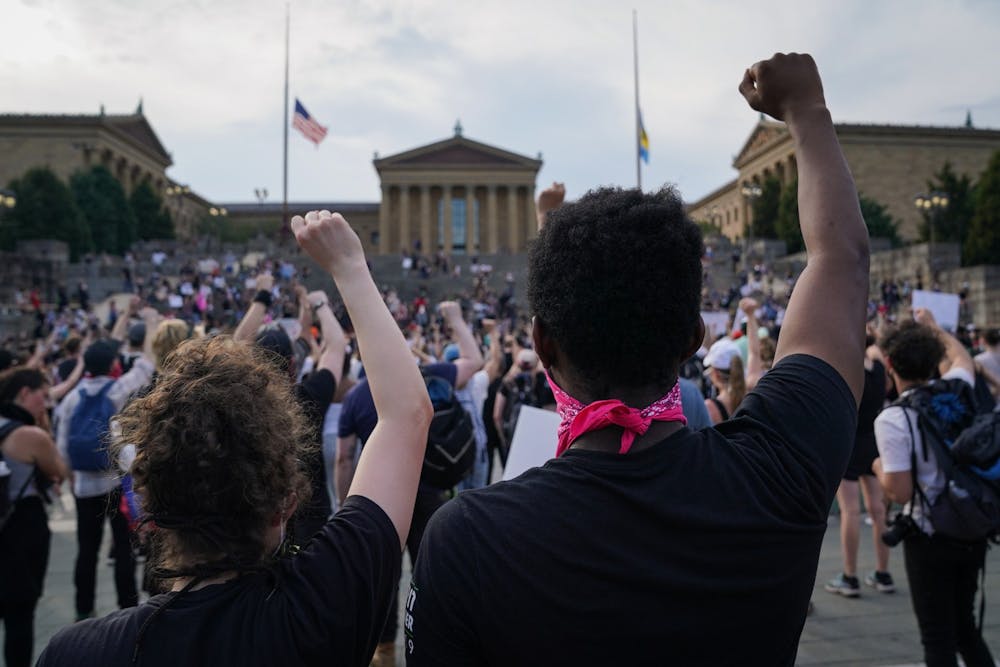
We’ve been here before, saw the looting, and went through the same emotions: anger, sadness, grief, despair, and guilt. We've said their names countless times: Trayvon Martin, Michael Brown, Freddie Gray, Sandra Bland. The examples are endless. These names trend for a while. We experience widespread outrage. “Fake woke” behavior arises. We put the hashtags on our social media. #Sayhername, #icantbreathe, #blacklivesmatter. And repeat. The problem is that the level of concern we express online doesn’t match the everyday behavior we exhibit. Until people practice anti-racist behavior, nothing will change.
The solution lies in where we will stand when all of the protests and social media posts die out. When the news stops covering George Floyd’s case. As someone who is tired of the cycle — wrongful death, post about it, protest, repeat — we must remain committed to the fight against injustice, even when it is not convenient.
This issue has been 400 years in the making, and in the monumental year of 2020, things have come to a halt. The Black community is fed up with empty promises of a brighter future that never materialize. Black people are dying from the coronavirus at disproportionate rates. Black motherhood mortality rates are steadily increasing. A majority of the Black population is currently unemployed. America doesn’t just discriminate against us within the criminal justice system, but within education, healthcare, wealth, and representation as well.
Evidently, we only care about improving the state of Black lives when a Black person has experienced a wrongful death. Why does someone have to die for people to care? We need more than temporary marches and demonstrations.
We need everyday justice.
We need active participants who are willing to engage in challenging or radical anti-racist work. Ibram X. Kendi wrote a bestselling book on the subject. He establishes that the opposite of ‘’racist’’ isn’t ‘’not racist,’’ but an anti-racist. An anti-racist is someone who openly opposes racism and fights against the powers that perpetuate it.
How do you become an anti-racist?
First, accept the truth regarding racism. Having Black friends or listening to rap music does not mean that you are not racist. Racism is very complex and multifaceted. It manifests in your worldview, how you react to Black people in your subconscious. These thoughts, if unmonitored, can evolve into microaggressions, discrimination, or even murder. It takes self-awareness to recognize that you’re struggling with racist sentiments, or to analyze what influences have formed your perception of race. Take the necessary time to challenge yourself in understanding the evolution of racism.
Second, learn the nuances involving racism and anti-Blackness. Anti-Blackness is an implicit hostility towards Black people. It proves the existence of race as a socially constructed continuum between two extremes — Black and white. At elite institutions, anti-Blackness is increasingly prevalent. In these spaces, those who speak African American Vernacular English are marginalized and are berated for either being ‘’too Black,’’ or even ‘’not Black enough.’’ Some mimic or appropriate Black culture. Many Penn students' lack of engagement with West Philadelphia, a predominantly Black area of the city, is a direct manifestation of this anti-Black mindset.
Third, commit to correcting the racism you may exhibit, whether in the form of microaggressions or overt prejudice. Racism lies in the comments you make about someone’s natural hair, talking over your Black classmates, or choosing to only associate with the Black people that you feel ‘’comfortable’’ around. It’s telling someone they are ‘’pretty for a Black girl.’’ It’s making the terms ‘’Black,’’ ‘’brown,’’ and ‘’people of color’’ synonymous — looping all minorities into one box when the battles we face individually deserve more distinction than that.
Being an anti-racist goes beyond skipping the N-word in a song. It takes more than reading books or donating funds. While those are valid attempts, they are only the beginning. It involves everyday consciousness. Stepping down from a position of privilege or power and leveraging it to give a Black person a rightful platform. Refusing to lament over your lack of exposure to Black issues, and offer to listen to our stories and our opinions instead. Overcoming a racist mental frame isn’t going to be easy. It will involve refusing to engage in behaviors that are counterproductive to achieving true equity.
We are responsible for the future we create for our children and grandchildren. The process of tackling racism and becoming an anti-racist won’t be easy, but it will be worth it. We deserve better.

SURAYYA WALTERS is a rising Wharton junior from New Rochelle, N.Y. concentrating in Marketing and minoring in Urban Education. Her email address is surayyaw@wharton.upenn.edu.
The Daily Pennsylvanian is an independent, student-run newspaper. Please consider making a donation to support the coverage that shapes the University. Your generosity ensures a future of strong journalism at Penn.
Donate







